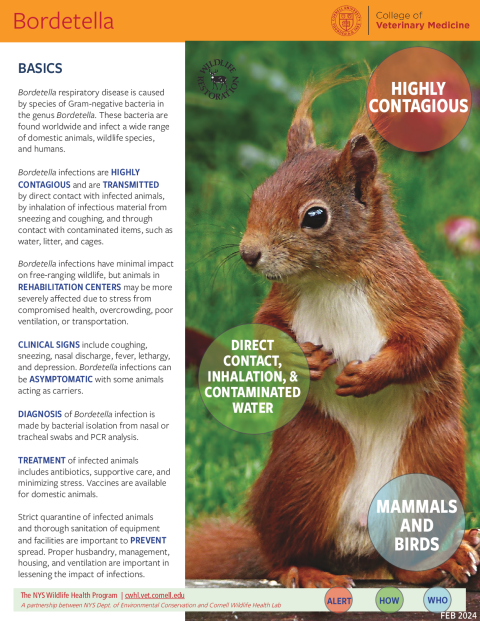Bordetella respiratory disease is caused by species of Gram-negative bacteria in the genus Bordetella. These bacteria are found worldwide and infect a wide range of domestic animals, wildlife species, and humans.
Bordetella infections are highly contagious and are transmitted by direct contact with infected animals, by inhalation of infectious material from sneezing and coughing, and through contact with contaminated items, such as water, litter, and cages.
Bordetella infections have minimal impact on free-ranging wildlife, but animals in rehabilitation centers may be more severely affected due to stress from compromised health, overcrowding, poor ventilation, or transportation.
Clinical signs include coughing, sneezing, nasal discharge, fever, lethargy, and depression. Bordetella infections can be asymptomatic with some animals acting as carriers.
Diagnosis of Bordetella infection is made by bacterial isolation from nasal or tracheal swabs and PCR analysis.
Treatment of infected animals includes antibiotics, supportive care, and minimizing stress. Vaccines are available for domestic animals.
Strict quarantine of infected animals and thorough sanitation of equipment and facilities are important to prevent spread. Proper husbandry, management, housing, and ventilation are important in lessening the impact of infections.
Bordetella bacteria can infect a wide range of mammals and birds, both domestic and wild.
B. bronchiseptica is the cause of kennel cough in domestic dogs and atrophic rhinitis in pigs. It has been isolated from numerous species of wild mammals, including rat, squirrel, porcupine, striped skunk, opossum, red fox, and raccoon.
B. avium causes an acute upper respiratory tract disease in domestic turkeys and has been isolated from wild birds, including mallard ducks, Canada geese, owls, partridges, and finches.
Wild mammals and birds may act as reservoirs of infection for domestic swine and turkeys, respectively.
In humans, B. pertussis causes whooping cough.
Water can act as an environmental source of B. avium. Wild birds living in and around freshwater, such as waterfowl, herons, and gulls, are frequently exposed to B. avium and can harbor the infection for long periods of time.
Clinical disease caused by Bordetella spp. occurs most often in domestic animals and wild species in rehabilitation settings due to stress. Outbreaks of clinical disease can occur in dogs, pigs, and turkeys when husbandry conditions are poor.
Infected red squirrels and eastern gray squirrels can develop pneumonia. They may also show profuse frequent urination leading to dehydration. Infections have resulted in deaths of squirrels in rehabilitation settings.
Although Bordetella spp. are not considered to be zoonotic pathogens, infections of B. bronchiseptica and B. avium causing respiratory symptoms have been reported in humans working closely with infected squirrels and birds. Infections are thought to be limited to immunocompromised people.


